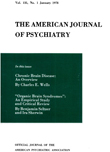Psychological Changes Following Surgical Treatment of Parkinsonism
Abstract
Twenty-five patients were tested and interviewed immediately before and at varying intervals after surgical treatment for parkinsonism to determine possible psychological changes. In both interviewing and psychological testing, no support was provided for the proposition that parkinsonism and schizophrenia are mutually opposed. The finding of a general postoperative elevation of mood among the patients could not easily be attributed to placebo effect, to improved function, or to a relief of tension similar to a postleucotomy effect. The authors conclude that the postoperative elevation of mood was a specific consequence of the operation itself.
Access content
To read the fulltext, please use one of the options below to sign in or purchase access.- Personal login
- Institutional Login
- Sign in via OpenAthens
- Register for access
-
Please login/register if you wish to pair your device and check access availability.
Not a subscriber?
PsychiatryOnline subscription options offer access to the DSM-5 library, books, journals, CME, and patient resources. This all-in-one virtual library provides psychiatrists and mental health professionals with key resources for diagnosis, treatment, research, and professional development.
Need more help? PsychiatryOnline Customer Service may be reached by emailing [email protected] or by calling 800-368-5777 (in the U.S.) or 703-907-7322 (outside the U.S.).



